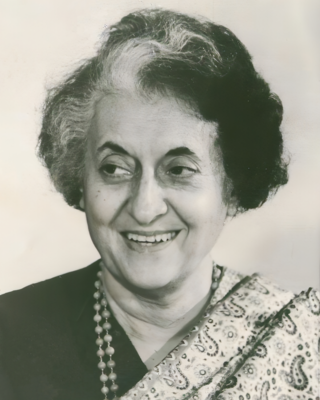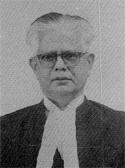Related Research Articles

Indira Priyadarshini Gandhi was an Indian politician and stateswoman who served as the Prime Minister of India from 1966 to 1977 and again from 1980 until her assassination in 1984. She was India's first and, to date, only female prime minister, and a central figure in Indian politics as the leader of the Indian National Congress (INC). She was the daughter of Jawaharlal Nehru, the first prime minister of India, and the mother of Rajiv Gandhi, who succeeded her in office as the country's sixth prime minister. Gandhi's cumulative tenure of 15 years and 350 days makes her the second-longest-serving Indian prime minister after her father. Henry Kissinger described her as an "Iron Lady", a nickname that became associated with her tough personality.

The Indian National Congress (INC), colloquially the Congress Party or simply the Congress, is a political party in India with deep roots in most regions of India. Founded on 28 December 1885, it was the first modern nationalist movement to emerge in the British Empire in Asia and Africa. From the late 19th century, and especially after 1920, under the leadership of Mahatma Gandhi, the Congress became the principal leader of the Indian independence movement. The Congress led India to independence from the United Kingdom, and significantly influenced other anti-colonial nationalist movements in the British Empire.

The Janata Party is an unrecognised political party in India. It was founded as an amalgam of Indian political parties opposed to the Emergency that was imposed between 1975 and 1977 by Prime Minister Indira Gandhi of the Indian National Congress. In the 1977 general election, the party defeated the Congress and Janata leader Morarji Desai became the first non-Congress prime minister in independent modern India's history.

Sanjay Gandhi was an Indian politician. He was a member of the Lok Sabha and was the younger son of Indira Gandhi and Feroze Gandhi.

The Emergency in India was a 21-month period from 1975 to 1977 when Prime Minister Indira Gandhi declared a state of emergency across the country by citing internal and external threats to the country.

Aandhi (transl. 'Storm') is a 1975 Indian political drama film starring Sanjeev Kumar and Suchitra Sen, and directed by Gulzar. At the time it was alleged that the film was based on the life of the then-Prime Minister Indira Gandhi and her relationship with her estranged husband, but in reality, only the look was inspired by the politician Tarkeshwari Sinha and Indira Gandhi. The story is based on a chance meeting of an estranged couple after several years, when wife Aarti Devi, now a leading politician happens to stay in the hotel run by her husband during an election campaign. The movie is noted for its songs composed by Rahul Dev Burman, written by Gulzar and sung by Kishore Kumar and Lata Mangeshkar.

Bansi Lal Legha, also known as Chaudhary Bansi Lal, was an Indian politician and independence activist, who served as the Minister of Defence of India and three-time Chief Minister of Haryana. He is also known as the 'architect of modern Haryana'.

Yeshwant Vishnu Chandrachud was an Indian jurist who served as the 16th Chief Justice of India, serving from 22 February 1978 until 11 July 1985. Born in Pune in the Bombay Presidency, he was first appointed a Justice of the Supreme Court of India on 28 August 1972 and is the longest-serving Chief Justice in India's history at 7 years and 4 months. His nickname was Iron Hands after his well-regarded unwillingness to let anything slip past him.

Hans Raj Khanna was an Indian judge, jurist and advocate who propounded the basic structure doctrine in 1973 and attempted to uphold civil liberties during the time of Emergency in India in a lone dissenting judgement in 1976. He entered the Indian judiciary in 1952 as an Additional District and Sessions Judge and subsequently was elevated as a judge to the Supreme Court of India in 1971 where he continued till his resignation in 1977.

Vidya Charan Shukla was an Indian politician whose political career spanned six decades. He was predominantly a member of the Indian National Congress, but also had spells in Jan Morcha, Janata Dal, Samajwadi Janata Party (Rashtriya), Nationalist Congress Party and Bharatiya Janata Party. He was known as a close associate of Indira Gandhi.
The 42nd amendment, officially known as The Constitution Act, 1976, was enacted during the Emergency by the Indian National Congress government headed by Indira Gandhi.

Rajindar Sachar was an Indian lawyer and a former Chief Justice of the Delhi High Court. He was a member of United Nations Sub-Commission on the Promotion and Protection of Human Rights and also served as a counsel for the People's Union for Civil Liberties.

Kissa Kursi Ka is a 1977 Indian Hindi-language political satire film directed by Amrit Nahata, who was a member of Indian parliament and produced by Badri Prasad Joshi. The film was a satire on the politics of Indira Gandhi and her son Sanjay Gandhi and was banned by the Indian Government during the Emergency period and all prints were confiscated. Music of the film was composed by Jaidev Verma.
People's Union for Civil Liberties (PUCL) is a human rights body formed in India in 1976 by Jayaprakash Narayan, as the People's Union for Civil Liberties and Democratic Rights (PUCLDR).

General elections were held in India between 16 and 20 March 1977 to elect the members of the sixth Lok Sabha. The elections took place during the Emergency period, which expired on 21 March 1977, shortly before the final results were announced.

The Turkman gate demolition and subsequent massacre was an infamous case of political oppression and police brutality during the Emergency when, on 31 May 1976, residents of Old Delhi were killed by police while protesting a slum clearance. An official account of the number of people killed at Turkman gate is not available and a media blackout ensued in the wake of the massacre. One local guide claimed that nine of his friends were killed by the police. More than ten bulldozers razed illegal structures and homes, and protestors were fired upon by police.

Jayantilal Chhotalal Shah was the twelfth Chief Justice of India from 17 December 1970 until his retirement on 21 January 1971. He was born in Ahmedabad.

The premiership of Morarji Desai extended from 24 March 1977 to 15 July 1979. In the 1977 Indian general election Morarji Desai led the Janata Party to victory against the Congress party. Upon taking office, Morarji Desai became the first Indian Prime Minister not belonging to the Congress party.
Amrit Nahata was an Indian politician, three-time member of Lok Sabha and film maker. He was elected to Lok Sabha twice from Barmer, as a member of the Indian National Congress, the second largest parliamentary constituency in India over twice the size of Belgium. However, he left Congress after the Emergency, and went on to direct the controversial film Kissa Kursi Ka in 1977. He later served a third term in Lok Sabha as a member of the Janata Party, representing Pali constituency.
Atma Jayaram was the Director of the Indian Intelligence Bureau between November 1971 to August 1975. His tenure was during one of the most turbulent political periods of modern India. He served under then Prime Minister Indira Gandhi.
References
- Citations
- 1 2 Sen 2002, p. 139.
- ↑ Palmer 1976, p. 95.
- ↑ INDIA Dates of Elections...
- ↑ Kritz & Mandela 1995, p. 235.
- ↑ Kritz & Mandela 1995, p. 236.
- ↑ Sen 2002, p. 140.
- 1 2 Kritz & Mandela 1995, p. 237.
- ↑ Hansen 2001, p. 133.
- ↑ Sen 2002, p. 142.
- ↑ Frank 2002, p. 426.
- ↑ Hewitt 2008, p. 158.
- ↑ Sarkar 1990, p. 18.
- ↑ Kumar & Agrawal 1993, p. 179.
- ↑ Ān̲ant 2010, p. 205.
- ↑ Sen 2002, p. 140-141.
- 1 2 Sen 2002, p. 141.
- ↑ Kumar & Agrawal 1993, p. 193ff.
- ↑ Srivastava 1999, p. 75.
- ↑ Mooij 2005, p. 175.
- ↑ Ān̲ant 2010, p. 172-173.
- ↑ Ān̲ant 2010, p. 206.
- ↑ Ān̲ant 2010, p. 250.
- ↑ Hewitt 2008, p. 165.
- ↑ Sezhian.
- ↑ National Library of Australia.
- ↑ "Indira Gandhi Interview | TV Eye | 1978". YouTube.
- ↑ Noorani, A.G. (12 April 2008). "Justice with a fine balance". Frontline. Retrieved 14 June 2018.
- Also see
- Ān̲ant, Vi Kiruṣṇā (2010). India since independence: making sense of Indian politics. Pearson Education India. ISBN 978-8131725672.
- Frank, Katherine (2002). Indira: the life of Indira Nehru Gandhi. HarperCollins. ISBN 978-0-00-638715-2.
- Hansen, Thomas Blom (2001). Wages of violence: naming and identity in postcolonial Bombay. Princeton University Press. ISBN 978-0691088402.
- Hewitt, Vernon (2008). Political mobilisation and democracy in India: states of emergency. Routledge. ISBN 978-1134097623.
- "INDIA Dates of Elections: March 16 to 20, 1977" (PDF). Inter-Parliamentary Union. Retrieved 15 March 2012.
- Kritz, Neil J.; Mandela, Nelson (1995). "India: Shah Commission of Inquiry, Interim Report I". Transitional Justice: How Emerging Democracies Reckon with Former Regimes, Volume III: Laws, Rulings, and Reports. US Institute of Peace Press. ISBN 978-1-878379-45-0.
- Kumar, Virendra; Agrawal, S. P. (1993). 1977. Volume 15, Part 1 of Committees and commissions in India. Concept Publishing Company. ISBN 978-8170224846.
- Mooij, Jos E. (2005). The politics of economic reforms in India. SAGE. ISBN 978-0761933434.
- Shah Commission of Inquiry : third and final report. National Library of Australia. 1978. Retrieved 15 March 2012.
- Palmer, N.D. (1976). "India in 1975: Democracy in Eclipse". Asian Survey. 16 (2): 95–110. doi:10.2307/2643138. JSTOR 2643138.
- Sarkar, Jnanadhir Sarma (1990). Commissions of inquiry: practice and principle with up to date case laws and commentaries. APH Publishing. ISBN 978-8170243311.
- Sen, Sankar (2002). Tryst with law enforcement and human rights: four decades in Indian police. APH Publishing. ISBN 978-81-7648-340-7.
- Sezhian, Era. "Shah Commission Report (document on emergency excess) lost and regained - Interview with Era Sezhian". Zocial TV. Retrieved 15 March 2012.
- Srivastava, Aparna (1999). Role of police in a changing society. APH Publishing. ISBN 978-8176480338.